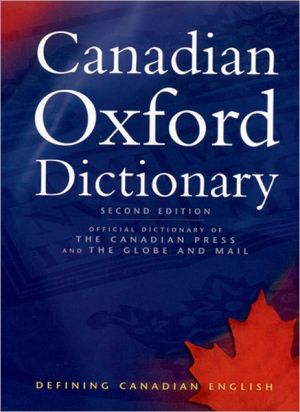Canadian Oxford Dictionary
Since it first appeared in 1998, The Canadian Oxford Dictionary has established a new authoritative standard. It answers basic questions about the language by giving advice on Canadian spelling and usage, and defining more Canadian words and senses (almost 2,000) than any other dictionary. The definitions, worded for ease of comprehension, are presented within entries in order of their familiarity or frequency in Canadian usage, making the dictionary easy to consult. An added feature is its...
Search in google:
Since it first appeared in 1998, The Canadian Oxford Dictionary has established a new authoritative standard. It answers basic questions about the language by giving advice on Canadian spelling and usage, and defining more Canadian words and senses (almost 2,000) than any other dictionary. The definitions, worded for ease of comprehension, are presented within entries in order of their familiarity or frequency in Canadian usage, making the dictionary easy to consult. An added feature is its encyclopedic element. It includes short biographies of over 800 Canadians and 5,000 indiviuals and mythical figures of international significance, and almost 6,000 place names, more than 1,200 of them Canadian. Library Journal Canadian English--historically overwhelmed by British and American linguistic influences--contains comparatively few terms unique to Canada. It comes as no surprise, then, that only about 2000 of the 130,000 entries in the this title are actually Canadianisms (e.g., "fishway," "outport," "pure laine," "riding," and "shit distributor"). Aimed at adults and older students, the Canadian Oxford also indicates preferred Canadian pronunciation and spellings; most of the rest of the lexical text, however, adheres closely to that found in the Concise Oxford Dictionary (1995. 9th ed.). The dictionary also includes brief entries for some 800 prominent Canadians and 1200 Canadian places, both useful encyclopedic features. The dictionary has two major competitors, the ITP Nelson Canadian Dictionary (Nelson Canada, 1996) and the Gage Canadian Dictionary (Gage, 1996). All three are reasonably current, similar in size (1700+ pages), and do a first-rate job of covering the small body of active Canadian English vocabulary, though the Canadian Oxford has a slight quantitative edge, claiming "almost two thousand Canadianisms, more than any other general dictionary." Most Canadian libraries will want all three, and larger U.S. libraries ought to have at least one, with the Canadian Oxford as the logical first choice.--Ken Kister, author of "Best Dictionaries," Tampa, FL Copyright 1999 Cahners Business Information.
\ Library JournalCanadian English--historically overwhelmed by British and American linguistic influences--contains comparatively few terms unique to Canada. It comes as no surprise, then, that only about 2000 of the 130,000 entries in the this title are actually Canadianisms (e.g., "fishway," "outport," "pure laine," "riding," and "shit distributor"). Aimed at adults and older students, the Canadian Oxford also indicates preferred Canadian pronunciation and spellings; most of the rest of the lexical text, however, adheres closely to that found in the Concise Oxford Dictionary (1995. 9th ed.). The dictionary also includes brief entries for some 800 prominent Canadians and 1200 Canadian places, both useful encyclopedic features. The dictionary has two major competitors, the ITP Nelson Canadian Dictionary (Nelson Canada, 1996) and the Gage Canadian Dictionary (Gage, 1996). All three are reasonably current, similar in size (1700+ pages), and do a first-rate job of covering the small body of active Canadian English vocabulary, though the Canadian Oxford has a slight quantitative edge, claiming "almost two thousand Canadianisms, more than any other general dictionary." Most Canadian libraries will want all three, and larger U.S. libraries ought to have at least one, with the Canadian Oxford as the logical first choice.--Ken Kister, author of "Best Dictionaries," Tampa, FL Copyright 1999 Cahners Business Information.\ \
